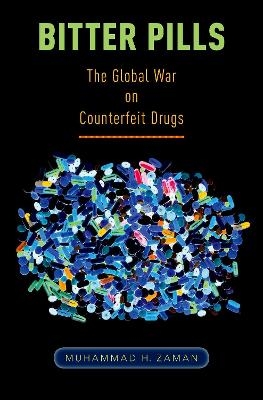
Bitter Pills
The Global War on Counterfeit Drugs
Seiten
2018
Oxford University Press Inc (Verlag)
978-0-19-021944-4 (ISBN)
Oxford University Press Inc (Verlag)
978-0-19-021944-4 (ISBN)
This book will heighten the public's awareness about counterfeit drugs, critically examine possible solutions, and help people protect themselves.
Long the scourge of developing countries, fake pills are now increasingly common in the United States. The explosion of Internet commerce, coupled with globalization and increased pharmaceutical use has led to an unprecedented vulnerability in the U.S. drug supply. Today, an estimated 80% of our drugs are manufactured overseas, mostly in India and China. Every link along this supply chain offers an opportunity for counterfeiters, and increasingly, they are breaking in. In 2008, fake doses of the blood thinner Heparin killed 81 people worldwide and resulted in hundreds of severe allergic reactions in the United States. In 2012, a counterfeit version of the cancer drug Avastin, containing no active chemotherapy ingredient, was widely distributed in the United States. In early 2013, a drug trafficker named Francis Ortiz Gonzalez was sentenced to prison for distributing an assortment of counterfeit, Chinese-made pharmaceuticals across America. By the time he was arrested, he had already sold over 140,000 fake pills to customers.
Even when the U.S. system works, as it mostly does, consumers are increasingly circumventing the safeguards. Skyrocketing health care costs in the U.S. have forced more Americans to become "medical tourists" seeking drugs, life-saving treatments and transplants abroad, sometimes in countries with rampant counterfeit drug problems and no FDA. Bitter Pills will heighten the public's awareness about counterfeit drugs, critically examine possible solutions, and help people protect themselves. Author Muhammad H. Zaman pays special attention to the science and engineering behind both counterfeit and legitimate drugs, and the role of a "technological fix" for the fake drug problem. Increasingly, fake drugs affect us all.
Long the scourge of developing countries, fake pills are now increasingly common in the United States. The explosion of Internet commerce, coupled with globalization and increased pharmaceutical use has led to an unprecedented vulnerability in the U.S. drug supply. Today, an estimated 80% of our drugs are manufactured overseas, mostly in India and China. Every link along this supply chain offers an opportunity for counterfeiters, and increasingly, they are breaking in. In 2008, fake doses of the blood thinner Heparin killed 81 people worldwide and resulted in hundreds of severe allergic reactions in the United States. In 2012, a counterfeit version of the cancer drug Avastin, containing no active chemotherapy ingredient, was widely distributed in the United States. In early 2013, a drug trafficker named Francis Ortiz Gonzalez was sentenced to prison for distributing an assortment of counterfeit, Chinese-made pharmaceuticals across America. By the time he was arrested, he had already sold over 140,000 fake pills to customers.
Even when the U.S. system works, as it mostly does, consumers are increasingly circumventing the safeguards. Skyrocketing health care costs in the U.S. have forced more Americans to become "medical tourists" seeking drugs, life-saving treatments and transplants abroad, sometimes in countries with rampant counterfeit drug problems and no FDA. Bitter Pills will heighten the public's awareness about counterfeit drugs, critically examine possible solutions, and help people protect themselves. Author Muhammad H. Zaman pays special attention to the science and engineering behind both counterfeit and legitimate drugs, and the role of a "technological fix" for the fake drug problem. Increasingly, fake drugs affect us all.
Muhammad H. Zaman is Howard Hughes Medical Institute Professor of Biomedical Engineering and International Health at Boston University
Prologue
Chapter 1: Cities in Crisis
Chapter 2: The Life of a Pill
Chapter 3: An Age-Old Problem
Chapter 4: Of Mice and Cats
Chapter 5: Unaware, Unable or Unwilling?
Chapter 6: Crime and Punishment
Chapter 7: Trust and Mistrust
Chapter 8: The Disconnected Citizens
Chapter 9: The Technological Fix?
Chapter 10: The Ivory Trade
Epilogue
| Erscheinungsdatum | 26.03.2018 |
|---|---|
| Zusatzinfo | 5 |
| Verlagsort | New York |
| Sprache | englisch |
| Maße | 213 x 142 mm |
| Gewicht | 454 g |
| Themenwelt | Sachbuch/Ratgeber ► Gesundheit / Leben / Psychologie |
| Medizin / Pharmazie ► Pflege | |
| Medizin / Pharmazie ► Pharmazie | |
| Studium ► 2. Studienabschnitt (Klinik) ► Pharmakologie / Toxikologie | |
| Naturwissenschaften ► Chemie | |
| Recht / Steuern ► Strafrecht ► Kriminologie | |
| Technik | |
| ISBN-10 | 0-19-021944-0 / 0190219440 |
| ISBN-13 | 978-0-19-021944-4 / 9780190219444 |
| Zustand | Neuware |
| Informationen gemäß Produktsicherheitsverordnung (GPSR) | |
| Haben Sie eine Frage zum Produkt? |
Mehr entdecken
aus dem Bereich
aus dem Bereich
Buch | Hardcover (2012)
Westermann Schulbuchverlag
CHF 44,90
Schulbuch Klassen 7/8 (G9)
Buch | Hardcover (2015)
Klett (Verlag)
CHF 29,90


